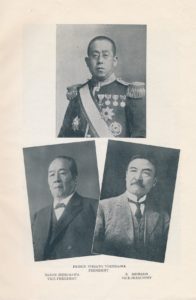
When war first erupted in Europe in 1914, there was uncertainty as to whether or not, or to what degree, Japan would support Great Britain and Britain’s other allies in their struggle with Germany, a conflict that seemed far away from Japan’s shores. Prince Tokugawa and Baron Shibusawa along with their Japanese supporters had spent the prior decade promoting peace. But when war erupted, out of respect international justice, they guided Japan to play a significant role in aiding the Allies – Despite Japan’s important contributions to the winning that conflict, relatively little is remembered today. Japan strongly assisted militarily and aided the Allies’ sick and wounded.
In 1917, out of empathy for the enormous suffering, death, and destruction in Europe during World War One (1914-1918), Prince Tokugawa and Baron Shibusawa, along with their Japanese supporters published a condolence booklet honoring their Allies. The photo illustration above is the first page from that condolence booklet that described the Japanese creating an association that collected a monetary fund that was gifted to Allied nations to help with their healthcare costs.
The portrait photos on the above page illustration are:
Prince Iyesato Tokugawa president of this organization, with Baron Eiichi Shibusawa (left) and Baron Saburo Shimada (right) the vice-presidents.
This booklet was titled:
“Japan to her Allies: A Message of Practical Sympathy from the Japan Association for Aiding the Sick and Wounded Soldiers and Others Suffering from the War in the Allied Countries.”
Below are the English and the French Editions of this booklet:
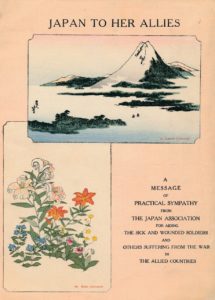
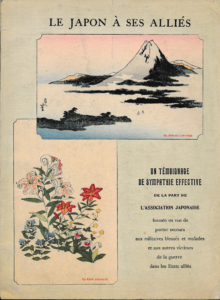
Theodore Roosevelt’s deep appreciation & heartfelt regard for the Japanese people in general & for Japan’s significant role in winning World War One is revealed by the below New York Times article written November 30, 1919, just seven months prior to his death.
WHAT THE JAPANESE HAVE STOOD FOR IN WORLD WAR
“This country should feel for Japan a peculiar admiration and respect.”
“There is not the slightest real or necessary conflict of interest between the United States and Japan in the Pacific.”
By THEODORE ROOSEVELT
(A Hitherto Unpublished Article, Written by the Late Ex-President Seven Months Before His Death)
The New York Times
Published: November 30, 1919
Japan’s career during the past fifty years has been without parallel in world history. Japan has played a part of extraordinary usefulness to the allied cause in this war for civilization. Japan’s friendship should be peculiarly dear to the United States, and every farsighted public man in the United States should do his utmost to keep a cordial working agreement of sympathy between the two nations. These three facts should be continually in the minds of every good American; and especially at this precise moment.
Japan’s sudden rise into a foremost position among the Occidental civilized powers has been an extraordinary phenomenon. There has been nothing in the past in any way approaching it. No other nation in history has ever so quickly entered the circle of civilized powers. It took the yellow-haired barbarians of the North who overthrew Rome six or eight centuries before the civilization they built up even began to approach the civilization they had torn town; whereas Japan tore down nothing and yet reached the level of her western neighbors in half a century. Moreover, she entered the circle of the higher civilization bearing gifts in both hands. Her appreciation of art and nature, her refinement of life, and many of her social conventions, together with her extraordinary and ennobling patriotism, convey lessons to us of America and Europe which we shall do well to learn. Every thoughtful American who dwells on the relations between Japan and the United States must realize that each has something to learn from the other.
In this war Japan has played a great and useful part. That she had her special and peculiar grievances against Germany goes without saying. So had we. She took these grievances to account precisely as we took our grievances into account. But she signed herself on the side of humanity and freedom and justice exactly as we did. Her duty has been, first of all, to drive Germany from the Pacific and to police and protect the Orient. If she had not done this it is probable that at the present moment a British and American force would be besieging Kiao-Chau and that our commerce would be suffering from German raids in the Pacific. Great Britain and the United States are able to keep their fleets out of the Pacific at this moment because the Japanese fleet is there. But she has done much more than this. Gradually, as the war has grown, she has extended her assistance all over the globe. Her volunteers have appeared in that most hazardous of all military branches, the air service, at the extreme fighting front. She has sent her destroyers to protect English and American troop ships and cargo ships in the Atlantic Ocean, the North Sea, and the Mediterranean. Japan’s part has been great; far greater than anything that she was called upon to do by her alliance with Great Britain. She first captured Kiao-Chau, and sank all of the Austrian and German ships out of the Pacific. *Soon thereafter she lent three of her cruisers to Russia to strengthen her fleet in the Baltic. At present her destroyers in the Mediterranean Sea and off the coasts of England, Spain, and France. Her submarines have been working in company with the Italians. The Transports from Australia and New Zealand have been conveyed safely by Japanese warships. Our own war vessels are free for convoying our troops across the Atlantic largely because of what Japan has done in the Pacific. She supplied enormous quantities of arms and munitions to Russia. She lent Russia heavy guns, and loaned her millions of dollars. She has given to the Allies quantities of copper. She has sent medical units to England, France, Russia, Serbia, and Rumania. She has offset the German intrigue in India. One in twenty-eight of the people of Japan belong to the Japanese Red Cross; one in four of the Japanese in this country are in the American Red Cross. Two thousand Japanese are fighting in the Canadian Army. ** Japan has done everything she has been asked to do or permitted to do in this war. And this statement will be questioned by no human being who is both honest and acquainted with the actual facts.
Yet, at this very time, when Japan’s sons are fighting beside ours in the waters of the Mediterranean and the Bay of Biscay and the North Sea and in the air over the western front, there are blatant Americans who have served Germany against America, who have played the German game to the limit, by striving to make trouble between Japan and the United States; by seeking every way to rouse suspicion and distrust of Japan in the United States; and by doing all that malevolent and unscrupulous baseness can do to taunt Japan into hostility to our country. There are in this country certain demagogic politicians, certain agitators seeking notoriety, and certain conscienceless and sensation-mongering newspaper owners and writers who are willing to make money or obtain preferment for themselves by any appeal to distrust and suspicion, no matter what infinite harm it does to this country. These sordid creatures have worked hand in glove with the scarcely more sordid creatures who are paid by Germany in downright cash to advance Germany’s aims, whether by striving to provoke an ill-will that might eventually produce war between the United States and Japan or in any other fashion. They have been guilty of conduct so shameful that it cannot be too strongly condemned.
Japan has a real admiration for America, dating back for sixty years to the time of Perry. The two nations have been in relations of close friendship. The Japanese have patiently borne misrepresentation, insults, and false accusations from various authors, writers, and public speakers of this country. They are a proud nation. They have suffered under this vilification. They have believed that our people would themselves realize the injustice of these attacks. Their belief is justified. Our people are beginning to understand that of recent years that most flagrant of these attacks have been made by German agents who worked diligently and secretly with ample Government money to create distrust between the two countries. The time has come for us Americans to show our trust and confidence in Japan as a great, loyal, modern people, whose seat at the table of the family of nations is next to ours, and who sit there on a full equality with all other civilized peoples. The rights and duties of the United States and Japan toward each other musts be treated on a basis of exact reciprocal equality. Each must have full control of all things vitally affected its own well-being; each must treat the other with frank and loyal courtesy and consideration.
The origin and persistence of German propaganda for the purpose of embroiling Japan and the United States is now fairly well recognized. Yet until Viscount Ishii openly and publicly accused Germany of being the agent of this nefarious work, the people of our country knew practically nothing about it. At a reception given by the National Press Club in Washington to Viscount Ishii as the head of the commission from Japan, September, 1917, he made an address which was for the most part devoted to exposing these insidious efforts of Germany. He said in part:
“For more than ten years a propaganda has been carried on in this country, in Japan, and, in fact, throughout the world, for the one and sole purpose of keeping nations of the Far East and Far West as far apart as possible; to break up existing treaties and understanding; to create distrust, suspicion, and unkindly feeling between neighbors in the Far East and in the West, and all in order that Germany might secure advantages in the confusion. I do not think that you, gentlemen, in your busy lives here during the last ten years have given more than passing attention to developments in the Far East. The well-equipped agent of your enemy and mine has taken advantage of your preoccupation or of your kindly credulity. For many years his work was easy. The world was flooded with talks of Japan’s military aspirations and Japan’s duplicity. Have these been borne out by history? Even now the German publicity agent whispers first in your ear and then in mine.”
His story is specious, and is told in dim light which falls upon sympathetic pictures cleverly painted by himself and presented to you and to me in the past. To the accompaniment of appeals to the human heart he tells to me other stories of your duplicity and to you of mine.
“For twelve years, gentlemen, up to the present time, those agents have worked among us and elsewhere persistently and cleverly. They have been supplied with unlimited resources. No wonder we have been deceived. A short time ago a bad blunder gave us a clue. The Zimmermann note to Mexico involving Japan was a blunder. It made such a noise that we were disturbed in our slumbers and so were you. This gave a check for a time, but since the agents have been hard at work. They were at work yesterday, and they are at work today. Every prejudice, every sympathy, every available argument has been appealed to and used to show to your people and to ours what a low, cunning enemy we have each in the other, and how much dependent we are upon the future friendship, support, and good-will of Germany.”
The Zimmermann note was an official invitation from Germany to Japan and Mexico to join in dismembering the United States; for Germany has with cynically impartial bad faith striven to draw her own profit from the ill-will she has endeavored to excite in each of the two nations, Japan and America. Every American public man, newspaper editor, speaker or writer who since the publication of the Zimmermann note has striven to excite America against Japan has been deliberately playing Germany’s game against this country. Such action amounts to moral treason to the United States.
If any person thinks this too strong a statement, I call his attention to the recent deliberate utterances of Secretary of State Lansing, ex-Secretary of State Root, and ex-Ambassador Gerard.
Mr. Lansing says: “There had unquestionably been growing up between the peoples of the two countries (Japan and the United States) a feeling of suspicion as to the motives inducing the activities of the other in the Far East, a feeling which, if unchecked, promised to develop a serious situation. Rumors and reports of improper intentions were increasing and were more and more believed. Legitimate commercial and industrial enterprises without ulterior motives were presumed to have political significance, with the result that opposition to those enterprises was aroused in the other country. The attitude of constraint and doubt thus created was fostered and encouraged by the campaign of falsehood which for a long time had been adroitly and secretly carried on by Germans whose Government, as part of its foreign policy, desired especially to so alienate this country and Japan that it would be at the chosen time no difficult task to cause a rupture of their good relations. Unfortunately there were people in both countries, many of whom were entirely honest in their beliefs, who accepted every false rumor as true, and aided the German propaganda by declaring that their Government should prepare for the conflict which they asserted was inevitable, that the interests of the two nations in the Far East were hostile, and that every activity of the other country in the Pacific had a sinister purpose.”
Mr. Root says: “There never has been in this country, so far as my observation and reading go, any more dangerous and persistent misrepresentation regarding the relations, the purposes, the character of another country with which we have relations than in the case of the relations between the United States and Japan. I haven’t the slightest doubt that the misrepresentations and the attempts to create the feeling among the people who have it all in their hands now, the attempts to create bad feeling between the United States and Japan, have been very largely the result of a fixed and settled purpose and that purpose, it seems to me, growing day by day more clear, was the purpose that formed a part of the policy of the great ruling caste of Germany which is attempting to subjugate the world today.
“For many years I was very familiar with our Department of Foreign Affairs, and for some years I was especially concerned in its operation. During that time there were many difficult, perplexing, and doubtful questions to be discussed and settled between the United States and Japan. During that time the thoughtless or malicious section of the press was doing its worst. During that time the demagogue seeking cheap reputation by stirring up the passions of the people to whom it appealed was doing his worst. There were many incidents out of which quarrels and conflicts might have arisen, and I hope you will all remember what I say. I say that, during all that period, there never was a moment when the Government of Japan was not frank, sincere, friendly, and most solicitous not to enlarge but to minimize and do away with all causes of controversy. No one who has any familiarity at all with life can be mistaken in a negotiation as to whether the one with whom he is negotiating is trying to be frank or trying to bring on a quarrel. That is a fundamental thing that you cannot be mistaken about. And there was never a more consistent and noble advocacy of peace, of international friendship and of real, good understanding in the diplomacy of this world than was exhibited by the representatives of Japan, both here and in Japan, during all these years in their relations to the United States. I wish for no better, no more frank and friendly intercourse by which Japan in those years illustrated the best qualities of the new diplomacy as between rulers.”
Mr. Gerard says: “All during the winter of 1914 Berlin Germans from the highest down tried to impress me with the great danger which they said threatened America from Japan. The military and naval attaches of the United States Embassy and I were told that the German information system sent news that Mexico was full of Japanese colonies and America of Japanese spies. Possibly much of the prejudice in America against the Japanese was cooked up by German propagandists, which we later learned to know so well.”
Japan’s friendliness and good faith were strikingly shown in the early days of the war, when the question arose whether, in case of war between the United States and Japan, Great Britain would be obliged to assist Japan. This was excitedly discussed here and in England. The proposed treaty of arbitration between Great Britain and the United States came up about this time and it was found that such a treaty was precluded by the terms of the alliance between Great Britain and Japan. It was at Japan’s request that the terms of her treaty with Great Britain be revised so as to remove the obstacle to the arbitration treaty to which Great Britain consented. This was Japan’s contribution to universal peace. Regarding this, Viscount Ishii said in his address to the National Press Club in Washington, “Now if Japan had the remotest intention of appealing to arms against America, how could she thus voluntarily have renounced the all-important cooperation of Great Britain? It would have been widely quixotic. Treaties are not ‘scraps of paper’ to Great Britain. Japan knew she could rely on Great Britain religiously to carry out her promise. It was my good fortune to be in the Foreign Office at Tokio at the time of the revision of the Treaty of Alliance with Great Britain, and, modest as was the part I took therein, I can give you the personal and emphatic assurance that there was at the time no one in the Government or among the public of Japan opposed to the terms of that revision. There is, one may surely be safe in saying, only one way to interpret this attitude of Japan. It is the most signal proof- if, indeed, any proof is needed – that to the Japanese Government and nation anything like armed conflict with America is simply unthinkable.”
Japan, alone among the Allies, has borrowed no money from the United States; and she has lent hundreds of millions to the other allied nations. The Japanese have made a record in war charities during the last four years which is of really extraordinary fineness and disinterestedness. The women of Japan used the same methods for raising money to be sent to Belgium and Serbia and elsewhere that our own women did. They had their “Japan Belgian Relief Society,” their “Japan Serbian Relief Society,” & they sent $150,000 to the Italian refugees who lost their homes when the Teutonic armies invaded Italy. Stimulated by these smaller but very active organizations, a movement was started which spread from end to end of the empire and then across to Korea. Its title is “The Japanese Association for Aiding the Sick and Wounded Soldiers and Others Suffering from the War with Allied Countries.” Its President is Prince Iyesato Tokugawa, President of the House of Peers. The Vice President is Baron Shibusawa, the financier so well known in this country. This fund collected amounted to $1,000,000 and was distributed as follows:
To Great Britain $184,000
France 184,000
Russia 184,000
Italy 184,000
Belgium 184,000
Serbia 60,000
Rumania 60,000
Ordinarily funds of this size and character are distributed by a committee, but this association adopted a less expensive and much more modern method. The money was sent to the Japanese official representatives in the various countries. A pamphlet was published in Japanese and in English under the title “Japan to Her Allies,” which stated the purposes of the association and also included articles written by leading men of the country, in which they set forth their sympathy with the sufferers, their opinion of Germany’s responsibility for the war, and her abominable methods of conducting it, and their belief in the ultimate victory, of the Allies. It is a remarkable publication; nothing quite equal to it has originated in any of the Occidental countries. The quality of the pamphlet is shown by the following quotation from the dignified and impressive statement of Count Terauchi, the Prime Minister and official spokesman of the Japanese people: “Far removed as the Empire of Japan is from the centre of action, and little as the people of Japan has suffered in comparison with their European allies, Japan and her people, none the less, know the meaning of war, and are able, therefore, to appreciate the sufferings and sacrifices of their allies as their own. The people of Japan feel themselves one with the people of the invaded countries, just as the people of the Allies do. They are one in sympathy and in the fight for international justice, and stand ready to share the hardships of the struggle to the fullest extent. *** As the Prime Minister of Japan it is my privilege and pleasure hereby to express the sympathy and good-will of the people of Japan for the allied armies and peoples in this day of trial. *** Though the amount contributed may seem no more than a mere trifle in comparison with the need of the suffering nations, the heartfelt sympathy and admiration of a whole nation go with it. Those who receive the gift of Japan may well look upon it as the widow’s mite that means more than all of the offerings of the rich.”
There is not time in this message to discuss fully our proper relations to Japan; I have set them forth as I see them- and as I see our proper position as regards all our international relations- in my book “Fear God and Take Your Own Part.” But there is always time to point out the elemental fact that this country should feel for Japan a peculiar admiration and respect, and that one of the cardinal principals of our foreign policy should be to secure and retain her friendship, respect, and good-will. There is not the slightest real or necessary conflict of interest between the United States and Japan in the Pacific; her interest as in Asia, ours in America; neither has any desire or excuse for acquiring territory in the other continent. Japan is placing a great part in the civilized world; a good understanding between her and the United States is essential to international progress, and it is a grave offense against the United States for any man by word or deed to jeopardize this good understanding.
The case has been put in a nutshell in Viscount Ishii’s eloquent and appealing address at Fair Haven, Mass., on July 4, which he closed with these words:
We trust you, we love you, and, if you will let us, we will walk at your side in loyal good-fellowship down all the coming years.
All good Americans should act toward Japan in precisely the spirit shown toward America by this able and eloquent Japanese statesman.
*The names of the three Japanese cruisers that were given back to Russia after the outbreak of the war, together with their original Russian names, are: Sagami, (Per aviet) 12,074 tons: Tango, (Poltava.) 10,960 tons, and Soya, (Varyag) 6,500 tons.
** Japan has financed her own part in the war without borrowing and has lent more than $500,000,000 to England, France, and Russia.
THE ART OF PEACE highlights the exciting and inspiring achievements of Prince Tokugawa and Baron Shibusawa, offering a new perspective and clarity on Japan and U.S. Japan relations during this fascinating and often tumultuous period of history.
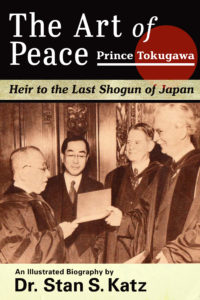
AVAILABLE THRU AMAZON:
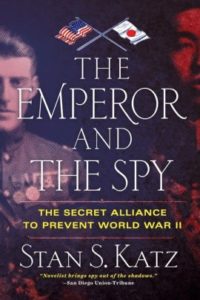
THE EMPEROR AND THE SPY is an exciting, historical espionage novel about the adventurous life of a masterful U.S. intelligence agent, Colonel Sidney Forrester Mashbir. The 2019 Revised Edition has just been published – Among Mashbir’s many exploits during his long military and diplomatic career, this saga presents his friendship with Prince Tokugawa and Baron Shibusawa, and their alliance to maintain goodwill between their nations.
Print, EBook & Audiobook thru AMAZON
Print & EBook thru BARNES & NOBLE and other book outlets
Leave a Reply